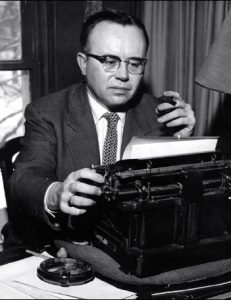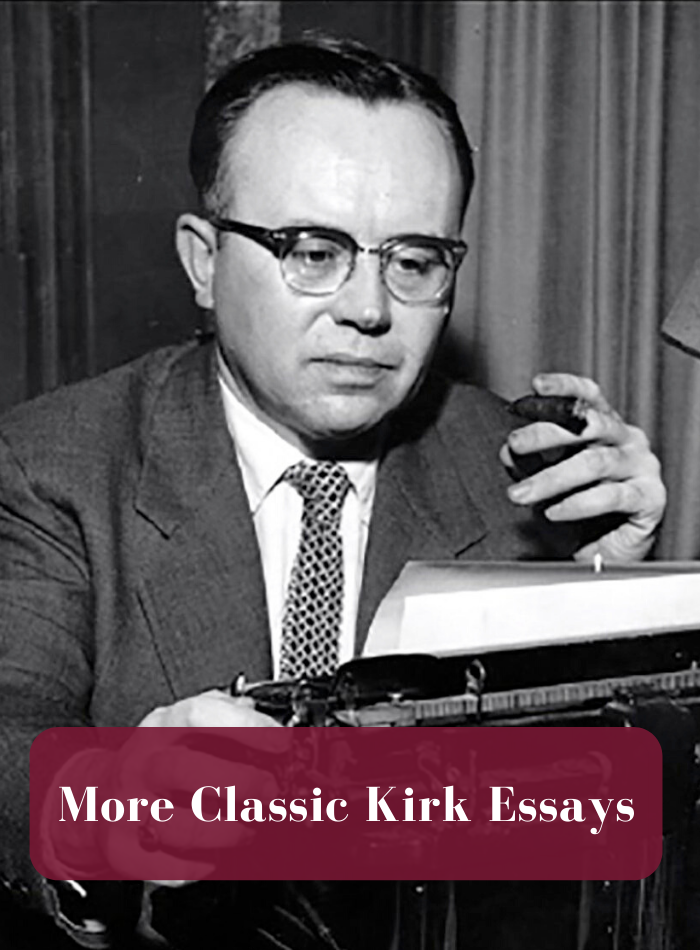 Classic Kirk:
Classic Kirk:
a curated selection of Russell Kirk’s perennial essays
A Note from the Editor
In one of his syndicated columns during the 1970s, Russell Kirk wrote, “There is nothing more conservative than conservation.” Kirk was an indefatigable walker of trails, an admirer of national parks, and the planter of hundreds of trees on his property. He believed that prudent stewardship of the Earth is an essential component of the conservative disposition. It is from this perspective, as well as that of a literary critic, that Kirk favorably reviewed Wendell Berry’s classic book The Unsettling of America: Culture and Agriculture.
Review of The Unsettling of America: Culture and Agriculture, by Wendell Berry (Sierra Club Books)
The Birmingham News, June 4, 1978
Agriculture is something far more important than “agribusiness” and something far better than “agripower.” So Berry—a poet and novelist who lives in Kentucky—tells us with knowledge and passion. He is heir to the “Southern Agrarians” of four decades ago, and worthy of them. Like Virgil in Roman times, Berry knows that agricultural labor is the foundation of a good society, and that a people cut off from the land lose their culture. Agriculture is not simply a means for producing foodstuffs to supply our decayed cities: it is a way of life, the way of life. As he puts it, “The society that is so glad to be free of the drudgery of growing and preparing food also boasts a thriving medical industry to which it is paying $500 per person per year. And that is only the down payment.” For a people who have forgotten genuine agriculture become unhealthy in more ways than one.
Mechanized farming on a vast scale is destroying our land, Berry argues convincingly; in the long run, it is wondrously inefficient, consuming the very earth through overtillage and erosion. “Modern” agriculture, using up energy in fossil fuels and other forms, undoes the ecology and cannot endure long—although we may be starving before we see the folly of “agribusiness.”
The best human cultures, he tells us, know a unity. But our modern civilization, “objective” and “specialist,” is fragmented, and therefore ignorant: “And it is within unity that we see the hideousness and destructiveness of the fragmentary—the kind of mind, for example, that can introduce a production machine to increase ‘efficiency’ without troubling about its effect on workers, on the product, and on consumers; that can accept and even applaud the ‘obsolescence’ of the small farm and not hesitate over the possible political and cultural effects; that can recommend continuous tillage of huge monocultures, with massive use of chemicals and no animal manure or humus, and worry not at all about the deterioration or loss of soil. For cultural patterns of responsible cooperation we have substituted this moral ignorance, which is the etiquette of agricultural ‘progress.’”
Wendell Berry spares nobody—not ever the Sierra Club, which publishes this book. He is contemptuous of the land-grant colleges, which ignore the agricultural problems of “disadvantaged” farmers, do next to nothing for the cultivation either of the mind or of the land, and have betrayed the America for which Thomas Jefferson hoped. He impartially denounces the farm policies of both Republican and Democratic administrations. He is a fearless champion of the neglected old virtues of work and thrift.
Berry is possessed of an intellect at once philosophic and poetic, and he writes most movingly. Humane culture has no better friend today than he. If, on taking up this book, the reader fancies that agriculture is all a matter of economics—why, he will have his eyes opened for him. Yet while the ground literarily is disappearing beneath our feet, the American public is told it ought to worry about such phenomena as the overdrafts of Bert Lance.* It is the terrible national overdraft upon our soil and our culture, so burningly described by Berry, which ought to be every thinking American’s urgent concern.
*Bert Lance was the director of the OMB under President Jimmy Carter and resigned due to a financial scandal during his first year in office.
Copyright © The Russell Kirk Legacy, LLC
 Classic Kirk:
Classic Kirk: